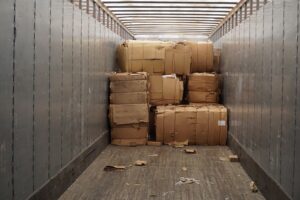Every business needs recycling equipment of some kind. In a one-person office, a recycling bin might get the job done. But a business that receives many shipments and/or generates a lot of recyclable waste needs high-volume equipment to manage all of its cardboard, paper, shrink wrap and other waste. Having onsite balers and compactors allows a business to condense and dispose of its waste in a cost-, space- and time-efficient way, and comply with any relevant recycling laws.
 Any time a business brings in new recycling equipment, there’s a decision to be made between buying and renting equipment. Buying equipment has advantages and can be the right choice for many businesses, but renting equipment makes more long-term sense for others. Your recycling services provider can help you evaluate your equipment options and determine what makes the most sense for your business—but first, familiarize yourself with the advantages of renting recycling equipment.
Any time a business brings in new recycling equipment, there’s a decision to be made between buying and renting equipment. Buying equipment has advantages and can be the right choice for many businesses, but renting equipment makes more long-term sense for others. Your recycling services provider can help you evaluate your equipment options and determine what makes the most sense for your business—but first, familiarize yourself with the advantages of renting recycling equipment.
Renting recycling equipment can save a business time and space.
If your business doesn’t already have recycling equipment onsite, renting equipment can free up valuable resources. Employees don’t have to spend time breaking down cardboard boxes and sorting/managing other waste when these materials can be fed into balers and compactors. Recyclables that have been baled are also easier to transport and take up less space than loose recyclables, which means you may save on pickup and transport costs from your recycling provider.
A business’s recycling equipment also generally takes up much less space than the series of recycling bins and dumpsters that would otherwise be required to manage its waste. If you don’t already have onsite equipment and you’re looking for ways to free up more space in your facility, consolidating waste disposal may be a solution.
Renting equipment may get you a tax deduction.
As you think about the costs of renting equipment for your business recycling needs, bear in mind the tax benefits. The IRS generally allows businesses to deduct rental payments for leased business equipment from their taxes. (Note that buying recycling equipment also creates a tax break. As of 2018, the Tax Cuts and Jobs Act allows taxpayers to deduct the full cost of business equipment for the tax year when it’s put into use.)
Renting takes maintenance and repairs out of your hands.
Recycling equipment needs routine maintenance (lubrication, repair, etc.) in order to work efficiently. Even more importantly, it must be regularly checked by knowledgeable maintenance personnel to ensure safe operation. Unless your business has baler or compactor operators with extensive experience on staff, you’re going to want to bring in experts for maintenance and repairs. These services should be included in your recycling rental contract with an equipment provider. A technician will come to you whenever something goes wrong, making maintenance as easy as possible for you.
Renting recycling equipment can be cheaper than buying.
While every business is different, renting recycling equipment can be cheaper than buying in many cases. Buying equipment is a major upfront expense that might create too much strain on a company’s budget. Renting it creates more predictable costs than buying. When you own your baler, it could break down and require expensive repairs at the worst possible time. With a rental contract, your business can accurately budget for its future recycling equipment expenses.
Owning equipment does have the advantage of giving your business assets that it can sell when done with them, which is something to consider when you’re comparing your options. Even a baler that no longer works can be sold as scrap metal.
Renting equipment makes it easy to make adjustments.
As an organization evolves, its recycling needs evolve too. Maybe your business is planning to expand over the next few years; increasing production will probably increase your waste output too. If your business buys a small baler now and outgrows it in 18 months, you’ll have to either buy a second baler or figure out how to sell yours and buy a larger replacement. Or, your business might buy high-volume equipment that’s expensive and uses a lot of energy to run—only for your business to shrink operations months later. Suddenly that big, expensive baler doesn’t seem like such a wise purchase.
Renting recycling equipment makes it easy for your business to keep its equipment in line with its current needs. Your provider can swap out your machines with different sizes/models as your business grows, with minor effort required on your part. You’ll always have access to the newest, top-of-the-line equipment without paying new equipment prices.
As your business considers its recycling equipment needs, Miller Recycling is your go-to resource for help and information. We’ll evaluate your space and ask questions about your processes to help you identify the size and type of equipment that works best for your business, then bring in the rental recycling equipment you need. Solutions to your maintenance and service questions are always just a phone call away. Contact me today to learn more.

